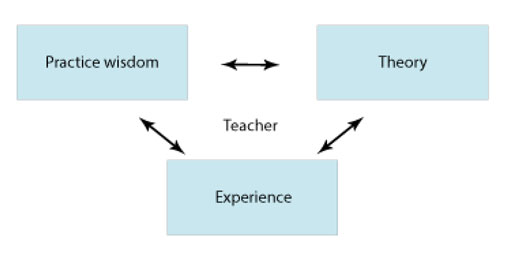1.2 Professional judgement and practice wisdom
You may hear the terms ‘professional judgement’ and ‘practice wisdom’ used during your ITE course, particularly if you ask a teacher why they made a particular decision about how to teach. Sometimes, it is difficult for an experienced teacher to unpack what lies behind their decision-making processes (Hobson, 2002, Jones and Straker, 2006). What often lies behind professional judgements or practice wisdom is years of experimenting with different approaches, incorporating different ideas from research, theory and practice, and constant critical reflection.
Activity 1: Practice wisdom, theory and experience
There is a triangular relationship between practice wisdom, theory and experience, see Figure 1 (Lunenberg and Korthagen, 2009).
Listen to ‘What’s in a name: mentoring and tutoring explained’ focusing specifically on the dialogue by Hannah Watson (mentor) and Dave Smith (tutor), about the difference between the two roles. (Please note that The Open University’s PGCE course mentioned in this audio has now been discontinued.)
Transcript: Audio 1
Diegetic
Non-diegetic
Diegetic
Non-diegetic
Diegetic
Non-diegetic
Diegetic
Non-diegetic
How does the discussion relate to Lunenberg and Korthagen’s diagram?
Discussion
Hannah clearly identifies the immediate, context specific nature of her role. She acknowledges the importance of being a good role model, yet being open and flexible enough to accept different opinions on practice. Although it is not explicitly stated, it is plausible that these different opinions and ideas may have come from previous experiences of teaching, personal experiences of teaching the classes at that school, and ideas from theory or literature.
Dave’s comments reveal that he believes it is his role to ensure that practice wisdom, theory and experience are brought together, considered and discussed with the student. He outlines his role as being one that ‘opens out’ the debate to beyond the immediate context. He explicitly mentions making links between theory and experience as a way of doing this.
Learning to teach is about working with these complexities, learning from them and successfully transferring your learning to new contexts. Reflective practice is one way to ensure this happens and we will now go on to think about what reflective practice involves.

